
I’m surely not the only one who often wonders what the performance footwear scene would look like if the World Athletics never posed the 40mm stack height/one embedded plate restriction on long-distance running shoes.
While some companies have already created running shoes that fall outside these parameters, the Puma Fast-RB is, in my opinion, the first shoe that showcases what super shoes might look like in an alternate universe.
With an incredible 58 mm maximum stack height, three embedded carbon plates and its laceless design, the Fast-RB looks and feels as whacky as it sounds. It’s a concept shoe that, unlike the Adidas Adizero Adios Pro Evo 1, has an incredible lifespan of 500 miles (approx. 800km).
It’s far from being affordable, and I’m sure at least some runners will be put off by its looks. Should you buy one, though, and how does the Fast-RB compare to the best running shoes on the market today? Let’s find out.
PUMA Fast-RB review
Price and availability
The Puma Fast-RB was announced in August 2024 and is available to buy now at Puma UK for a recommended price of £300. US and AU prices and availability are yet to be confirmed. As a concept shoe, don’t expect to find many retailers stocking the Fast-RB, so if you find it anywhere, make sure you buy it as soon as possible.
Specifications
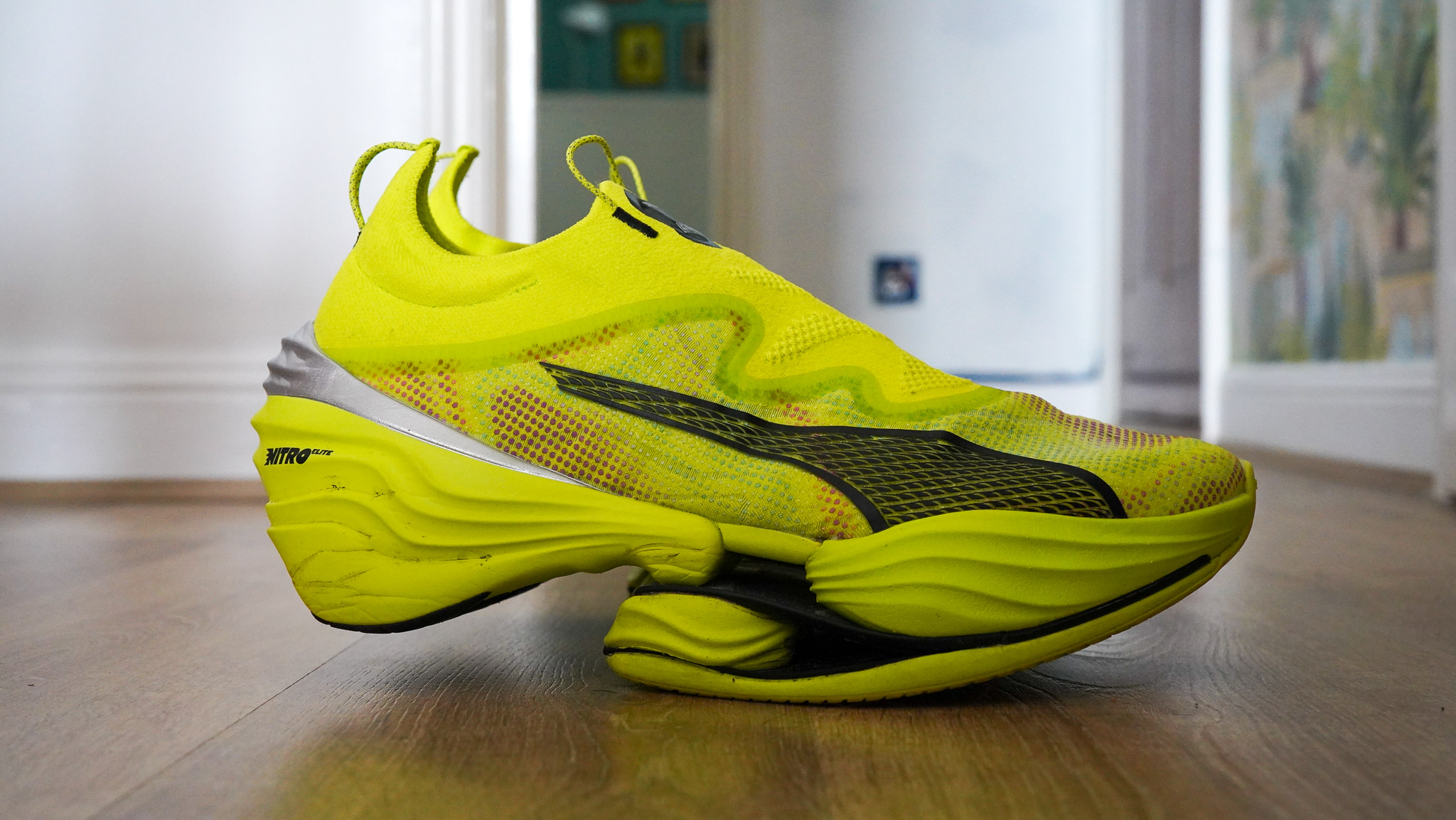
- Best for: fast training, tempo and sprint runs, long distances
- Tested weight: 377g/ 13.3oz (men’s UK 10/ US 11)
- Stack height: 58mm (heel), 46mm (forefoot)
- Drop: 12mm
- Fit: true-to-size (slightly narrow)
- Support: Neutral
Design and materials
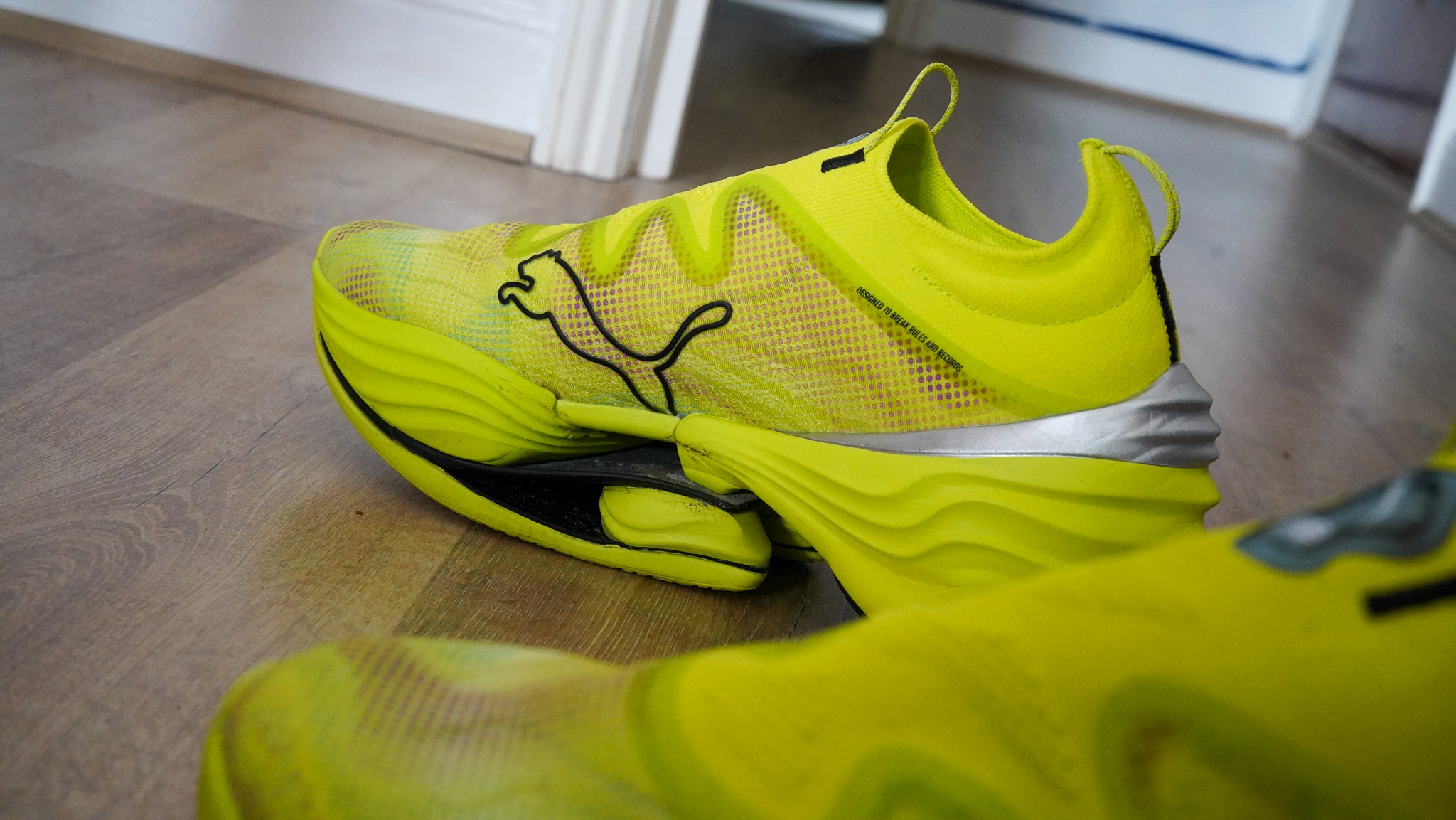
Although it’s probably the most ‘out there’ concept from Puma, Fast-RB (Rule Breaker) looks similar to the brand’s other super shoes, namely the Puma Fast-R Nitro Elite and its successor, the Fast-R Nitro Eilte 2, with its two-part midsole and exposed carbon plate.
Of course, the Fast-RB pushes the concept much further than those two. A good example of this is the heel. Despite the 58 mm maximum stack height – nearly 50% taller than the limit set by the World Athletics – when the shoe is set down, the heel hovers over the ground without touching it.
This is due to the Fast-RB's front-heavy construction. Puma added not one or two but three PWRPLATEs, two of which are at the front. The plates separate three sections of Nitro Elite foam under the heel and forefoot, and two pods are sandwiched between the two plates under the midsection of the foot.

The pods aren’t air-filled like in the case of the Nike Alphafly 2; they are more like smaller blocks of the same Nitro Elite foam found elsewhere in the Fast-RB. Speaking of the Alphafly 2, the Fast-RB is much heavier than Nike’s super shoe, clocking in at 377g/ 13.3oz (men’s UK 10/ US 11). The Alphafly 2 weighs 269 grams in the same size.
The peculiarities don’t stop there. The Fast-RB has a laceless upper made from Puma’s ULTRAWEAVE material, a lightweight engineered fabric. It’s reinforced with PWRTAPE in critical, high-wear areas for durability. Two pull tabs around the ankle help pull the shoes on more easily.
While we’re on the subject of durability, the Puma Fast-RB has an impressive lifespan of 500 miles, much longer than your average running shoe. This is an unusual but welcome feature, especially considering the higher asking price.
Performance and comfort
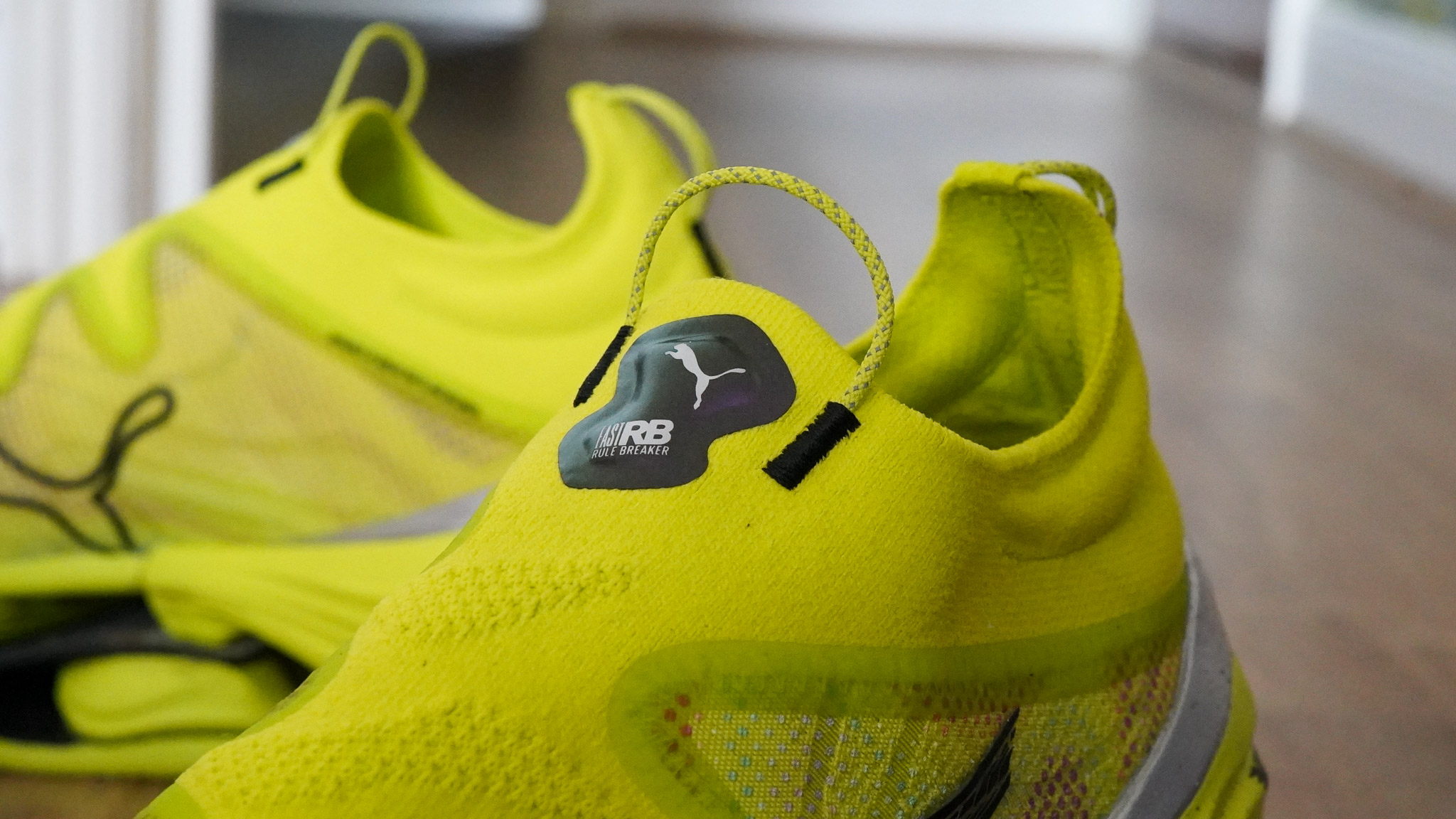
As expected, running in the Puma Fast-RB is a unique experience. The shoes behave very much like other super shoes, but the stack height and the plates make each stride more dynamic and energetic.
I love the extra foam under the heels. I live on a hill with a road leading down to the seafront, and I often start running downhill, which provides an excellent opportunity to test the cushioning of running shoes.
Thanks to the extra foam under the heels, the Fast-RB made the descent effortless. Plus, the shoes roll exceptionally well, and the three plates give you an extra boost at each step. Most super shoes do all those things, too, but in this case, the sensation is amplified multiplefold, making you feel like you’re flying.
The upper is tight, and there is no way to play around with the fit using the laces, either. It’s an interesting approach, considering that the shoes aren’t light, so I feel adding the lace cage wouldn’t have made too much difference (i.e. made the shoes much heavier).
From what I can tell, there is no internal heel counter, but your foot sits deep in the midsole, providing some support in the rear. I experienced no chafing around the ankles, and apart from the tightness in the midsection, the Fast-RB fit well on my wide feet.

There seems to be plenty of PumaGrip outsole to wear away, so traction is on point. Cornering was harder in the shoes, not just because of the stack height but also because of the disjointed middle part of the midsole.
The plates provide some stiffness, as expected, but the section with the pods moves (slightly) separately from the main part of the shoe, which made me turn more carefully to reduce the torsion force on the sole. Maybe I’m just being too cautious, but I didn’t want my shoes to break after a couple of weeks of use!
All that said, it’s an insanely liberating experience to run fast in the Puma Fast-RB. The shoes practically make you fly, and the legs feel fresh as a daisy, even after long and arduous sessions on the road.
I actually looked forward to threshold sessions, something I otherwise despise, because I knew I’d got to wear the Fast-RB. That’s how fun the shoes are.
Who’s the Puma Fast-RB for?

The Fast-RB is for those who stop at nothing to get faster. It is for runners who are happy to spend the extra cash to achieve marginal gains. It is for athletes who feel restricted and want to see their full potential. It is for those who can afford a fast shoe that cannot be used for verified races but only for training.
Should you buy the Puma Fast-RB?
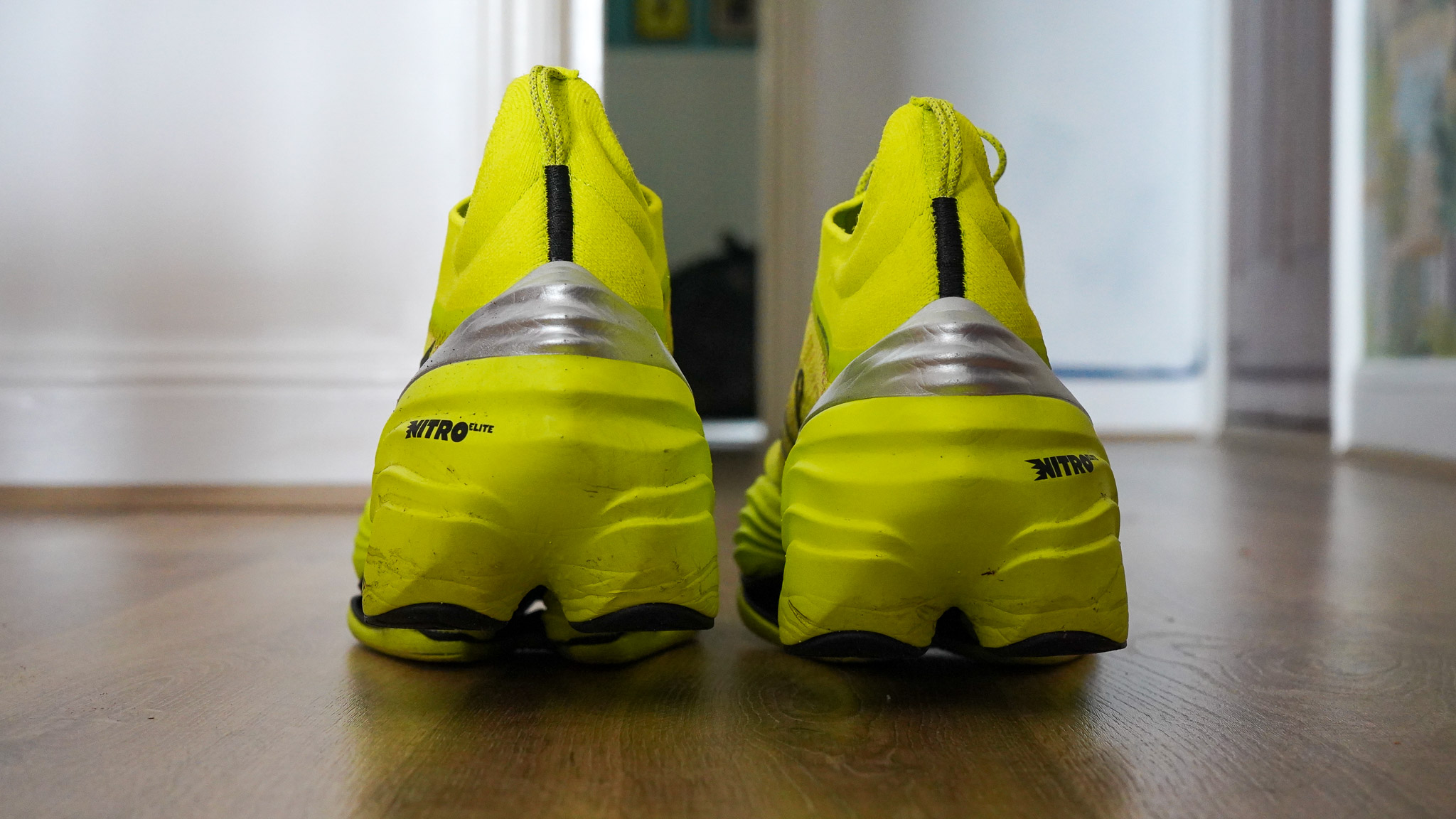
On the one hand, the Puma Fast-RB is well worth the price, considering the long lifespan and the speed it allows you to achieve. On the other hand, it’s an expensive shoe that’s ‘illegal’ to use on races and only works well as part of a running shoe rotation, significantly narrowing the potential buyers down. If you can find a pair, have enough disposable income, and want to see how fast you can run, I’d recommend trying the Fast-RB.
Verdict
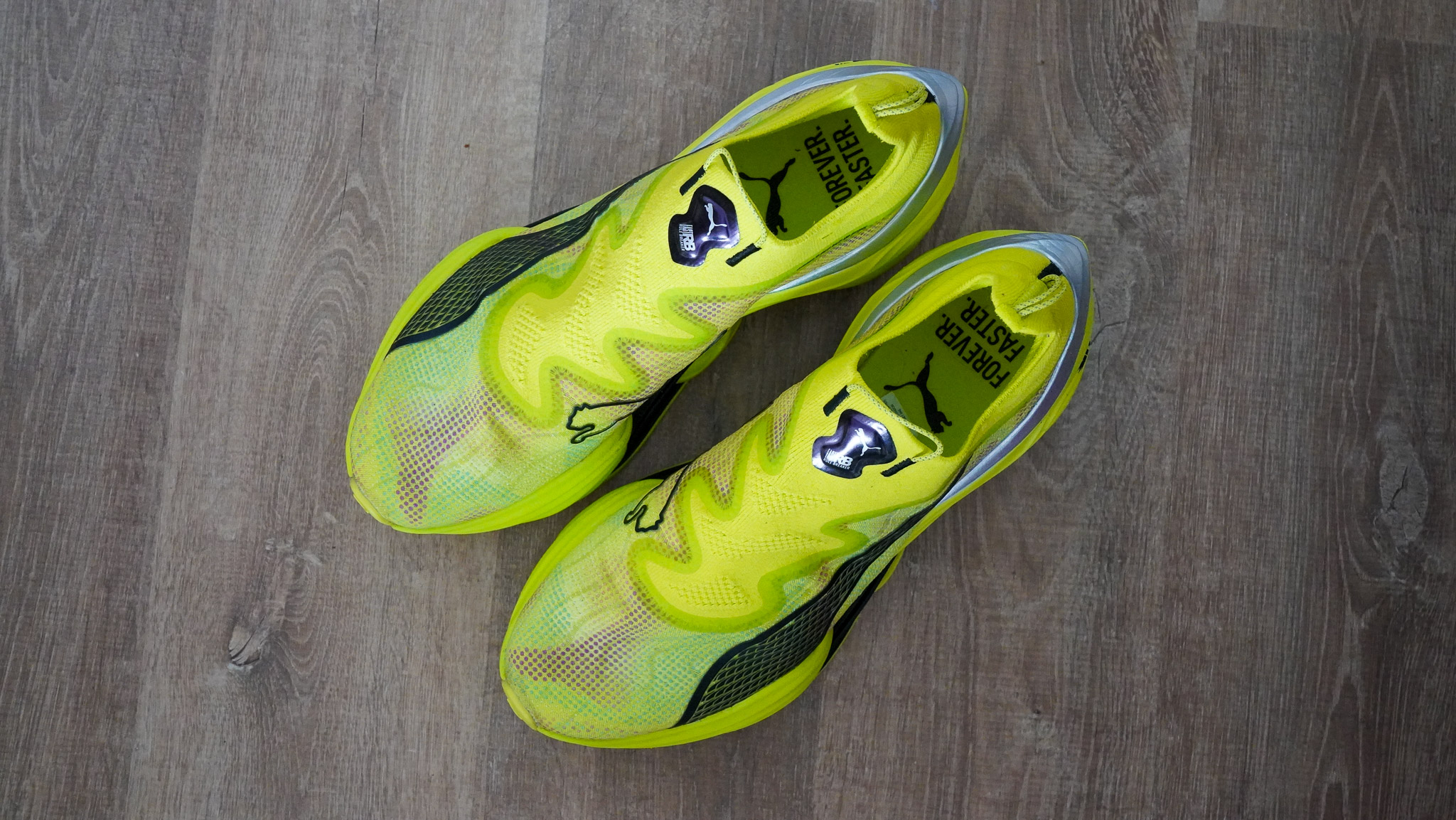
The Puma Fast-RB is a niche running shoe, even more than other super shoes. To a certain degree, it falls in the same category as the New Balance SuperComp Trainer and Adidas Adizero Prime X 2 Strung training shoes while also sharing the same DNA as some of the fastest shoes, such as the Adidas Adizero Adios Pro 3.
It’s a super exciting concept of footwear that pushes the limits of what we expect from running shoes. It might not be ‘race legal’, but the Fast-RB certainly is a breath of fresh air in a world of iterative running shoe design. It’s not for everyone, but those who wear it will be able to go real fast, which I know is an enticing possibility for many runners out there.
Also consider
Nike Alphafly Next% 2: Known for its high stack, carbon plate, and speed-boosting design, it's a top choice for competitive runners.
Adidas Adizero Adios Pro 3: A proven race-day shoe with carbon-infused technology and lightweight design, great for long-distance running.
New Balance FuelCell SuperComp Trainer: Offers a cushioned, fast ride with carbon plates, designed for tempo runs and fast training.
Asics Metaspeed Sky+: A top-tier racing shoe with carbon plates, engineered for runners who want to maximise stride efficiency.
Saucony Endorphin Pro 3: A versatile shoe with a PWRRUN PB midsole and Speedroll technology, built for marathon-level endurance and speed.
Adidas Adizero Prime X 2 Strung: A maximalist training shoe with a hefty stack and carbon rods, pushing boundaries much like the Fast-RB.







